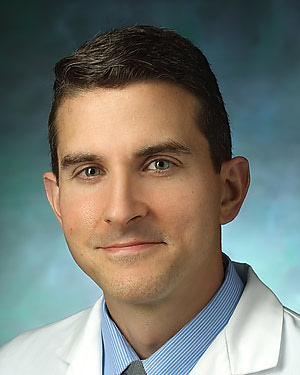Research Lab Results
-
Sean Berenholtz Lab
Work in the Sean Berenholtz Lab focuses on patient safety, ICU care, quality health care and evidence-based medicine. Two notable and successful projects include the National On The Cusp: Stop BSI project, which was implemented in 47 states with the goal of eliminating bloodstream infections, and the Agency for Healthcare Research and Quality (AHRQ)-funded Keystone ICU project, which improved communication and teamwork and reduced hospital-acquired infections in more than 100 ICUs in Michigan. One recent study focused on ventilator-associated pneumonia (VAP), one of the most common type of health care-associated infections in the ICU. Existing VAP prevention intervention bundles vary widely on the interventions, but our research team described a structured approach for developing a new VAP prevention bundle. -
Clare Rock Lab
Dr. Clare Rock is an assistant Professor of Medicine, Division of Infectious Diseases at the Johns Hopkins University School of Medicine, Associate hospital Epidemiologist at the Johns Hopkins Hospital, and Faculty Member at Armstrong Institute for Patient Safety and Quality. Her research interest focuses the prevention of pathogen transmission in the hospital environment. This includes novel strategies of improving patient room cleaning and disinfection, including human factors engineering approaches, and conducting robust clinical trials to examine effectiveness of ""no touch"" novel technologies such as UV-C light. She has particular interest in carbapenem-resistant Enterobacteriaceae transmission in the hospital environment, including outbreak management, and transmission and epidemiology of Clostridium difficile. Her other area of interest is diagnostic stewardship, and the behavioral, cultural and human factors aspects of implementation of initiatives to enhance appropriate use of diagnostic tests. She leads a national initiative, as part of the High Value Practice Academic Alliance, examining strategies for appropriate testing for Clostridium difficile. This is a wider implementation of work that Dr. Rock conducted with The Johns Hopkins Health System facilities. Dr. Rock has multiple sources of grant funding including from the Agency of Healthcare Research and Quality, Centers for Disease Control and Prevention, and industry. Dr. Rock is Vice Chair of the Society for Healthcare Epidemiology of America Research Network, and serves on the SHEA research committee. Dr. Rock earned her M.B.B.Ch. at the University College Dublin School of Medicine, National University of Ireland, and her MS masters of clinical science of research at the University of Maryland, where she received the MS scholar award for epidemiology. -
Elizabeth Daugherty Lab
The Elizabeth Daugherty Lab conducts research on patient safety, critical care infection control and critical care disaster response. We investigate methods of improving patient safety through improved infection control, with a focus on clinical outcomes, nosocomial infection rates and the individual and organizational obstacles to personal protective equipment adherence.
-
Robert Gilman Lab
Research in the Robert Gilman Lab focuses on disease control. Our work led to the development of microscopic-observation drug-susceptibility (MODS), a rapid tuberculosis diagnostic technique. We continue to conduct infectious disease research based at Peru’s Universidad Peruana Cayetano Heredia.
-
Patrick Breysse Lab
Research in the Patrick Breysse Lab seeks to better understand the biological, chemical and physical factors that can impact a patient’s health. Our team is currently studying the effects of indoor and outdoor air pollution on childhood asthma, respiratory tract infections, chronic obstructive pulmonary disease (COPD) and other respiratory conditions. We also conduct research on secondhand smoke exposure around the world and have participated in a range of health and exposure studies in Peru, Nepal, Mongolia, Columbia and India.
-
Arturo Casadevall Lab
The Arturo Casadevall Lab uses a multidisciplinary approach to explore two key topics within microbiology and immunology: how microbes cause disease and how hosts can protect themselves against those microbes. Much of our research focuses on the fungus Cryptococcus neoformans, which frequently causes lung infections in people with impaired immunity. We also work with the microorganism Bacillus anthracis, a bacterium that causes anthrax and is frequently used in biological warfare. Our goal is to devise antibody-based countermeasures to protect against this and other similar threats.
-
Andrea Cox Lab
Research in the Andrea Cox Lab explores the immune response in chronic viral infections, with a focus on HIV and the hepatitis C virus (HCV). In our studies, we examine the role of the immune response upon exposure to HCV by examining responses to HCV in a longitudinal, prospective group of high-risk individuals. This enables us to compare the innate, humoral and cellular immune responses to infection with clearance versus persistence. Through our findings, we seek to identify mechanisms of protective immunity against HCV infection and improve HCV vaccine design.
-
Asad Latif Lab
Research in the Asad Latif Lab focuses on patient safety and quality improvement. Our key interests include preventing hospital-acquired infections and improving health systems, the evaluation and prevention of healthcare errors and the utility of telemedicine in intensive care units. One recent study focused on reducing medication errors (the single most common type of error in healthcare) related to drug formulation in the intensive care unit. -
J. Marie Hardwick Laboratory
Our research is focused on understanding the basic mechanisms of programmed cell death in disease pathogenesis. Billions of cells die per day in the human body. Like cell division and differentiation, cell death is also critical for normal development and maintenance of healthy tissues. Apoptosis and other forms of cell death are required for trimming excess, expired and damaged cells. Therefore, many genetically programmed cell suicide pathways have evolved to promote long-term survival of species from yeast to humans. Defective cell death programs cause disease states. Insufficient cell death underlies human cancer and autoimmune disease, while excessive cell death underlies human neurological disorders and aging. Of particular interest to our group are the mechanisms by which Bcl-2 family proteins and other factors regulate programmed cell death, particularly in the nervous system, in cancer and in virus infections. Interestingly, cell death regulators also regulate many other cellular processes prior to a death stimulus, including neuronal activity, mitochondrial dynamics and energetics. We study these unknown mechanisms. We have reported that many insults can trigger cells to activate a cellular death pathway (Nature, 361:739-742, 1993), that several viruses encode proteins to block attempted cell suicide (Proc. Natl. Acad. Sci. 94: 690-694, 1997), that cellular anti-death genes can alter the pathogenesis of virus infections (Nature Med. 5:832-835, 1999) and of genetic diseases (PNAS. 97:13312-7, 2000) reflective of many human disorders. We have shown that anti-apoptotic Bcl-2 family proteins can be converted into killer molecules (Science 278:1966-8, 1997), that Bcl-2 family proteins interact with regulators of caspases and regulators of cell cycle check point activation (Molecular Cell 6:31-40, 2000). In addition, Bcl-2 family proteins have normal physiological roles in regulating mitochondrial fission/fusion and mitochondrial energetics to facilitate neuronal activity in healthy brains.
Principal Investigator
Department
-
Justin Bailey Lab
We study human B cells and neutralizing antibody responses against hepatitis C virus (HCV), hepatitis B virus (HBV), SARS-CoV-2, and respiratory syncytial virus (RSV). Our overarching hypothesis is that understanding the B cell response in individuals who naturally control infections, and those who have been vaccinated, can help us to understand the basic biology behind successful immune responses, leading to design of more effective vaccines. A particular technical strength of our laboratory is high dimensional flow cytometric analysis of antigen-specific B cells, which allows us to phenotype these rare cells, and also to sequence B cell receptor (BCR) repertoires and isolate virus-neutralizing monoclonal antibodies (mAbs).


